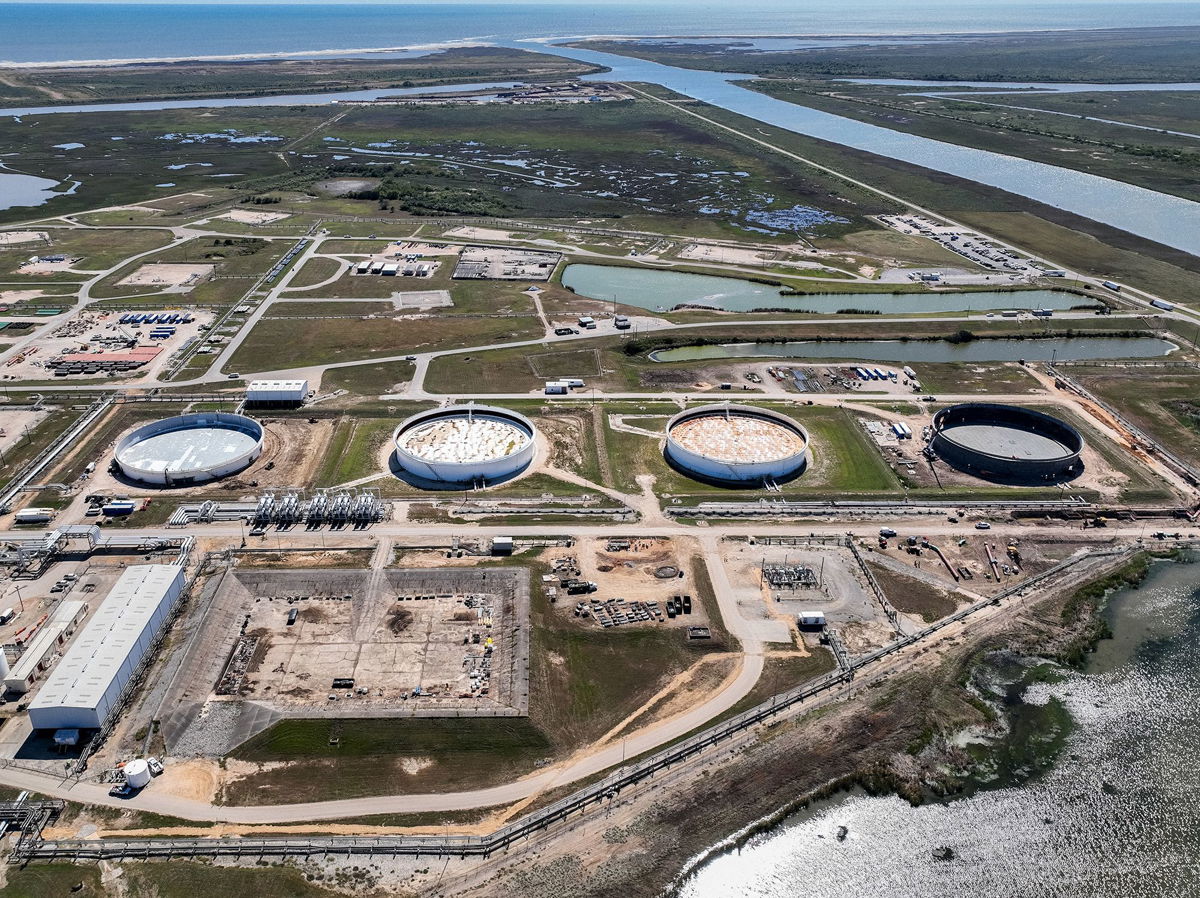America’s emergency oil reserve is at a 40-year low — and that could inflate oil prices, Goldman Sachs says

In an aerial view
By Matt Egan, CNN Business
New York (CNN Business) — America’s emergency oil stockpile has plunged to 40-year lows. The shrinking Strategic Petroleum Reserve is limiting Washington’s ability to shield consumers from the fallout of Saudi Arabia’s aggressive supply cuts, according to Goldman Sachs.
“At this point, US energy policy has fewer bullets left. It has less levers left in its policy toolkit,” Daan Struyven, head of oil research at Goldman Sachs, told CNN in a phone interview.
That’s one reason Goldman Sachs expects oil prices to stay high, averaging $100 a barrel this time next year. Triple-digit oil would boost already-high prices at the pump, worsening inflation and potentially influencing the 2024 race for the White House.
To cushion the blow from the war in Ukraine, the Biden administration has released vast amounts of oil from the SPR, the underground series of storage tanks along the Gulf Coast that contains emergency oil.
Industry veterans say that strategy helped mitigate the hit to consumers as gasoline prices plunged after hitting $5.02 a gallon in June 2022.
But the SPR, which acts as a rainy-day fund that presidents can tap during times of war or natural disaster, is down by about 270 million barrels over the past two years to the lowest level since August 1983.
That point is not lost on Wall Street investors, let alone OPEC.
“Because the level of the SPR is quite low, you would need a larger shock to energy prices or to supply to start releasing barrels again,” Struyven. “The hurdle to exercise the insurance policy is bigger when you have less insurance left.”
The Energy Department has already been forced to scrap plans to buy oil to refill the SPR due to high prices.
Struyven now expects the SPR to get refilled by just a “super slow” pace of 1.5 million barrels per month.
US officials have previously stressed that even after the sizable emergency releases, the SPR is still the largest emergency reserve of oil on the planet.
“We have, by far, enough to be able to deal with any emergencies over the next couple of years,” Energy Secretary Jennifer Granholm told CNN in July.
Saudi Arabia’s ‘very assertive’ strategy
Rather than an outright emergency, the recent jump in energy prices has been driven in large part by OPEC.
Oil prices hit 10-month highs this month after Saudi Arabia and Russia vowed to extend their supply cuts. That in turn sent gasoline prices surging to nearly $4 a gallon nationally. Gas prices have since cooled a bit, with the national average for gasoline dipping to $3.83 a gallon on Wednesday, according to AAA.
“The Saudis have been very assertive in exercising their pricing power,” Struyven said.
The Goldman Sachs executive described the Saudi strategy as “unique” because its “quite large” drop in production is happening in an environment where demand is strong and supply is not excessive. Saudi output has plunged by 2 million barrels per day over the past year, equaling about 18% of their total production.
Saudi Arabia has an incentive to keep oil prices high in order to balance their budget. Struyven notes the kingdom has plenty of expensive projects to fund.
Moreover, Saudi Aramco, the country’s national oil company, is considering raising money through a share sale. The higher oil prices go, the greater the appetite for shares of Aramco.
“The Saudis benefit a lot from higher prices,” Struyven said.
As does Russia, which has similarly holding back supply as it seeks to boost revenue to fund its war machine.
Oil CEO warns of $150 oil
World oil stockpiles are expected to tumble by 70 million barrels over the next three months due to the supply cuts, according to Bank of America.
That’s why Bank of America on Wednesday ramped up its Brent oil price forecast to an average of $91 a barrel in the second half of this year, up from $81 a barrel previously.
“Russia and Saudi Arabia have shown a strong alignment in providing support to the oil market between $80 and $100,” Francisco Blanch, head of commodities research at Bank of America, wrote in a note to clients.
Some in the oil industry are warning prices could spike even higher.
Doug Lawler, CEO of oil driller Continental Resources, cautioned that oil could spike to $120 to $150 a barrel unless the US government does more to encourage production.
“That’s going to send a shock through the system,” Lawler told Bloomberg on Monday.
A spike to $150 would drive up gasoline and diesel levels that could threaten to spark a recession and seriously worsen inflation.
‘Extremely high prices’ not likely
Yet Wall Street analysts are skeptical that Saudi Arabia would let things get to that level because it would risk killing the golden goose.
“The political calculus could start to change above $100/barrel,” BofA’s Blanch wrote. “With a US presidential election approaching, internal OPEC+ dynamics could make a big difference to the oil price outcome next year.”
Blanch said another spike in energy prices “risks reigniting inflation fears around the world, higher interest rates and eventually financial turmoil.”
Goldman’s Struyven directly pushed back on the warning of $150 oil.
“That’s definitely not our base case. We think there are several mechanisms in the market that should prevent prices from rising to extremely high levels,” he said.
For instance, US frackers would respond to higher prices by aggressively pumping more oil. That would limit prices from getting too high.
“US shale is not dead. There is still flexibility in the system,” Struyven said.
Perhaps the biggest reason: Saudi Arabia self-interest. The kingdom knows that if prices get too high, people will be forced to drive and fly less. Plus, $150 oil would fuel investments in clean energy, accelerating the transition away from fossil fuels.
“Extremely high prices destroy long-term demand for Saudi barrels,” Struyven said.
CNN reached out to the Energy Department on this story, which declined to comment.
The-CNN-Wire
™ & © 2023 Cable News Network, Inc., a Warner Bros. Discovery Company. All rights reserved.



